Daley Downing's Blog
November 16, 2025
The New Outsiders
So, in the past several months, two new bookstores have opened in my real life vicinity. On the one hand, you could assume that I, a seasoned bookdragon, would be absolutely thrilled about this. And I truly wish I could be. Because, on the other, I have discovered that neither of these places makes me feel welcome.
What?! How!? I hear you cry. After all, yes, I’ve been at this authoring thing for almost 8 years, I’ve been reading and honing my love and appreciation of literature for much longer than that, and no, I’m not well-known, but my books exist on Barnes & Noble’s online catalog, and that is nothing to sniff at. So, why wouldn’t I feel included at a bookstore?
Well, let’s start with Store A. (I’m not in the business of public shaming, so everything here remains anonymous; the point is the behavior and the mindset.) Back when Store A first opened, they launched a website, newsletter, and social media page, insisting they wanted to reach out to the community and draw in readers, writers, and publishers. I signed up for the newsletter, filled out the contact form, and began following the social media feed. In about a six-week span, I had been unsubscribed from the emails (yeah, I know…), no one ever responded to my contact details, and their posts stopped showing up on my timeline.
At first, I was gobsmacked. I had literally never done anything to this place, never spoken to the owners, never even set foot on the premises. (I think I’d brought up the store in conversation with someone at a library program once, and it was neutral.) Whereas seeing those posts about upcoming events and author Q&A and publishing workshops at Store A initially gave me sparks of joy and excitement, now felt like huge doors slammed in my face, cold, stark, and baseless rejections that stung terribly.
But after a bit, I drew in many deep breaths, adopted a, “Okay, screw you, then” attitude, and moved on. Store B — whose opening had been delayed more than once — had finally started accepting customers; and, to their credit, they did get back to me (at first) about joining their schedule of planned author events. After my most recent experience, I tamped down my hopes (which is pretty soul-crushing in itself), and quietly prayed for the best.
In the meantime, I went to Store B and checked it out. I attended a couple of events. It felt…weird. …Yup, weird. The inventory was very limited. The space was quite small. Just navigating the crowd/chairs/tables/frilly decor to find an open two inches to stand and peruse the shelf you’ve spent 10 minutes trying to get to…only to find you’ve read 90% of them, and could easily obtain the rest from the library…and that all titles were full retail price…was not a satisfying time.
The other, big thing that jumped out at me about Store B’s stock was…not a single indie author. It was all big names, ones I easily recognized or was at least previously acquainted with. Initially, I applied the benefit of the doubt; after all, a brand new business wouldn’t have a huge catalog from every single spectrum of publishing right off the bat…Right…?
However, after attending the events, I knew, for certain, that there was a distinct bias towards trad pub and small presses being “more legit” than self-publishing. The astounding level of ignorance among the audience about how one might release a book (meaning, they were all convinced finding an agent was the ONLY way); and the flabbergasting level of arrogance displayed by authors (meaning, that was the ONLY way they accepted as proper) made me not-metaphorically nauseous. I was almost embarrassed that I’d ever reached out to this place.
(By the way, my contact with Store B went from sporadic to completely dropping off about a month ago. I’m pretty sure they’ve forgotten all about me, and it is not a fun feeling.)
And here’s where I get to the crux of the biscuit and lay out the ugliness of it all: Bookstores need to stop playing these games. Indie authors are just as valid and important as trad pub. Readers who prefer indie titles are just as important and needed and as those who focus on mainstream releases. Indicating (however subtly) that one is superior to the other will drive a further wedge between the trad and indie camps. In about a decade, indie authors have gone from being seen as a serious contender in the industry to considered subpar, untalented hacks releasing vanity projects to stoke our ego. This damaging perspective will drive self-publishing dreams back to the dark ages — and for no good reason.
We’ve become, again, the outsiders in a field we thought we’d conquered. We indies find ourselves scrambling to hold onto the respect we thought was now guaranteed. When I first took the plunge and made a Nook Press account (and underwent the formatting nightmare for the first of many times), I received mountains of praise for my courage, and achievement. But bit by bit, I’ve seen the support fade for so many of us, the cheerleaders drift off, and the skepticism and cynical takes return, and it’s not okay.
I’m so tired of being the outsider.
October 7, 2025
What’s Happened to Publishing?
Good morning! Hopefully none of you forgot about me, seeing as I haven’t posted in, well, a while. But over the last several weeks, I’ve found myself really struggling with just what to discuss here. And that’s for a bunch of reasons, which I’ll go into in a minute.
I wasn’t even sure what to title this post. I went with publishing, because I mean reading, and writing, and distribution, and the fact how we read — and what’s considered “valid” publishing has absolutely changed in recent years — so my goal is to cover a lot of territory, pretty much all of it under the generalized heading of “books.”
If you’re into any of the hobbies/interests/pursuits I am, you’ll have noticed something in the last decade or so about books. Not all that long ago, if you enjoyed reading for fun, you just went to the nearest library and took out a few titles that seemed cool, read them, returned to the library, and rinse and repeat. It was fine; more than that, for many of us, it filled in parts of our souls; it helped us learn about other cultures, dream of societies that may one day come to be, and made us laugh or healing-cry in ways other activities or endeavors did not. A book that really resonates with us, that seems to speak directly to our heart, is an incredibly valuable thing.
But. Then. Reading became a trend. Entire websites were created out of thin air to encourage us to gush lovingly about the authors/titles we cherished; and, unfortunately, even more so, to whine and bitch and rage about the ones we definitely did not. And, after a lot of introspection on this topic, I’ve realized something very, very bad: Goodreads has become about tearing down those with differing opinions, rage-baiting us into huge shouting matches regarding style and genre and totally subjective things, like whether first or third POV is “better.”
It’s only the start of the whole big problem. Now more than at any other point in civilized history, so many people are literate, and have access to a variety of reading material — physical copies, digital, audiobooks, trad pub, indie, even fanfiction has basically settled in as an acceptable category. For maybe the first time ever, comics and graphic novels are counted as reading by a lot of the mainstream book culture. This should simply be a positive thing. But.
If you’ve been on any social media platform (and indeed, there are gazillions of those now, too) discussing reading or writing since about 2015, you’ll know exactly what I’m saying. The trend dictates that we argue: trad versus indie, literary fiction versus genre fiction, modern versus classic. And that’s just the tip of the iceberg. Prologues, yes or no? Which is better, series or standalones? Death to all the tropes! — except all the favorite tropes! And these hot-button topics have to include timely, relevant, and so-new-it-won’t-happen-till-an-hour-from-now points and remarks and perspectives straight off the Instagram and Tiktok accounts of influencers who (surely) read 4389 books last year.
And in the end, what will we accomplish? Does anybody actually change their mind on prologues, “not like the other girls,” trilogies, or whether audio counts? Mostly…they don’t.
This is not fun. It’s not beneficial. It’s dumb. And exhausting.
Being a reader in this kind of toxic environment (because, yes, it is toxic) is hard enough. Now imagine being a writer on the battlefield of BookTok and BookTube. Your work could be subjected to unfair criticism, based solely on what tropes it does, or doesn’t, include; what narration style you like to use; whether you employed enough of this season’s buzz words; and how comparable to other recent releases your blurb makes your novel sound.
This is, by the way, assuming every influencer or reviewer who received a copy of your publication will, in fact, read it. Because, it turns out, now that “books” is a trend — and “literature” solidly an industry — we’ve reached the level of social-media-famous people (who used to work in marketing or fashion or tourism) being paid to record a prepared 30-second synopsis of what a publisher tells them they should say about the book.
And, because so many people are consuming short-form content (because no one can afford TV anymore and newspapers and magazines are all going digital and making you pay a lot more for them), this is how a whole lot of folks find out about new releases, and that’s what they’re buying.
And then… People realize these books were either AI produced, or ghostwritten (possibly by several individuals using very different outlines), or that they were rushed through, and…the short version is, these books suck. Titles spend 2 weeks on the bestseller list, only to be tossed into thrift store donation boxes, crammed into Little Free Libraries, placed on dozens of shelves in charity shops and library sales. This is, ironically, now its own trend, with the industry showing no signs of learning from their mistakes and preparing to pivot away.
Amid this turmoil, indie authors and the small press have absolutely claimed their spot. Marketing is more genuine (since budgets are smaller). Yes, there are some self-pub folks who use AI to create their content and don’t see an issue with doing so; but many of us are firmly against that, and readers do notice, and appreciate, the difference in how a totally-human-authored title reads. We are — almost without intending — a vital part of the industry, since eventually (I do believe) sales for trad pubs will drop (maybe dramatically across another couple seasons), and more readers will push for libraries and brick-and-mortar stores to carry indie works. That’s already started.
So, seeing as it appears I’ve nailed the answer to the question, “what’s happened to publishing?”, why do I continue to pontificate and opine?
Because we are not yet through the storm. We are presently in the middle of it. Right now, authors’ careers can be ended in one week by a handful of BookTok snobs lacking reading comprehension. Agents are deliberately told to reject queries that “sound too original or not on-topic.” Bookstores that aren’t part of a chain won’t stock non-trad-pubbed works because they’re convinced sales will take a big hit. You may not be invited to bookish events depending on your genre, your target audience, or your determination not to bring specific cultural discussions into the literary space.
(It’s actually happened to me. Years ago I was cut out of an entire group of fantasy authors because I mentioned Biblical lore/history in my debut, but did not blatantly label my work as “Christian fiction.” My work isn’t Christian fiction; it’s told from a Western world POV that recognizes the commonality of that religion and its affects on lifestyle and society, while also using, as plot points, many other mythologies and ancient tales. Like Tolkien, I despise allegory; so there isn’t meant to be a religious theme or message woven into my writing. Those who don’t like that, well, tough; I won’t change what/how I write just to placate them.)
But. (Here’s where what I’m about to admit really stings.) When you get removed, or choose to remove yourself, from a writing/reading community, you end up even more “out of the loop” (indies always risk being “out of the loop” by virtue of not having a big publicity team behind us). And when one of your main goals is to reach readers (not to become rich and famous, but to simply share your work), not gaining social media followers is a huge obstacle.
We have to engage in feeding the beast, to achieve what we desire, even if the method of getting there makes our skin crawl. No, I don’t expect to earn a living from my authorship; but, holy crap, that’d be amazing if I could. I poured literal blood, sweat and tears into my books; I want them to find their niche and be appreciated. I suck at typical marketing — because I won’t try to make myself into something/someone I’m not. I have no issue hollering into the void, “Hey, do you like cozy fantasy with characters who are nice people and belong to a secret organization that know the truth about monsters and mythical creatures and are in control of a warehouse full of magical artifacts? Yeah? Read my books!”But I hate comping, I hate pitches (Canva’s stealing art now, too, so I refuse to even make a mood board), and my body dysphoria prohibits taking provocative selfies with printed copies. Could I be reaching more potential readers by feeding the beast? Sure, that’s always a possibility. However.
I need to be able to sleep at night, confident in the knowledge that I made professional choices that won’t tear apart the personal me. That comes before sales, every time.
Hence, we are, at the moment, in the storm between the past of publishing (which was, yes, more exclusive, but also made sense and produced some truly great literature), and the present…whatever this mess is.
So, to the inevitable: How do we get through it?
My recommendation is to use public libraries as much as possible. Read low-star reviews of popular new releases (yes, I just said that), and compare not only the critiques of different (non-paid!) posts, but also think about what you want from a book. Don’t fall for the hype train — don’t rush to buy a title that “everybody is loving.” Save your hard-earned money for a release that speaks to your heart (for example, as a late birthday gift to myself, I did splurge on a new science-fantasy inspired by one of my favorite classics — because the whole premise made my soul sing).
The saying goes that companies start to change the way they’re doing business when customers hit them where it hurts: in the wallet. If we buy less AI-generated rubbish, eventually publishers will catch on.
Buy more indie. Request indie titles be included in your library system, or at that little corner bookstore. Review indies on not just Amazon, but Barnes & Noble (I’m a Nook Press author!), Kobo, Google Books, and if you still blog, on your blog. If somebody asks you to recommend a new read, throw a small press offering their way.
And don’t forget, this isn’t an “us versus them” situation. Plenty of trad authors are living, breathing humans who write every single sentence on the pages that bear their name (shout-out to my friend CG Drews!). Lots of agents and editors want real, live humans submitting queries and entering contests. Many online anthologies or zines won’t accept anything made via AI. It’s about banding together for artistic and integrity, and to increase access to literature while maintaining a standard of quality.
Can we make it?
July 14, 2025
It’s Year Eight: Time for a Whole Post About Supernatural!

So, why, in 8 years of blogging, have I never before posted about this show that is, regardless of all its issues, in my top 10 of TV series, that has inspired my own writing, and will always have a special place in my heart?
Well, to be honest, at first it was simply because the show broadcast new episodes for so long — I mean, 15 seasons, wowser — and it’s hard to get a feel for your thoughts on the entire series before you know how it finishes. And I was way behind — since I didn’t have access to the CW after about 2008, I had to catch up on the reruns on TNT, and then when all the seasons finally came to Netflix, I found multiple gaps in my viewing.
Anyway, now that the show definitely has completed production, and I’ve now seen probably 80% of the entire canon (and what I’ve skipped has been deliberate, and I read up on the Wiki, anyway) — and we’ve all had a few years to digest this enormous banquet of lore and plot and characters — I feel like this is a good time to have the discussion.
Warning: Strap yourselves in. This is going to be probably my longest musing/gushing/rant yet. (Yup, probably even more than The Vampire Diaries.) Brew a whole pot of tea, get out the whole box of cookies, and don’t forget to schedule in a bathroom break.
So, Supernatural. I imagine, even if you weren’t a viewer, you’ve at least come across (it’d be almost impossible not to by now) some casual knowledge of the basics: Two brothers, raised to hunt and kill all the stuff that goes bump in the night, pulled against their will into the ongoing battle of good versus evil, for the preservation of humanity itself. Dean and Sam Winchester are the central characters in this mostly-drama, sometimes-comedy, often beautifully poignant, undeniably long-winded tale of monsters and folklore and theology and urban legends.
The show started as absolutely just Monster Of The Week, with a new ghost/creature featured most early episodes, occasionally devoting a few scenes to furthering the subplot of seasons 1 and 2 — which focused on the brothers finding their father, John, who had gone missing before the start of the canon. While all of this was well and good — honestly, “the boys” (as we were all calling them before the pilot was even over) had great chemistry and connection from the first second, and their live-to-fight-another-day ethos was so inspiring — eventually we did need a meatier and more consistent plotline.
So, I don’t think anybody was actually upset when the long-running narrative of one particular Big Bad demon having it out for the Winchesters was introduced. Especially since this quickly led to peeling back the layers on all the world mythology that built the backdrop of the show’s premise, and naturally coming to what every civilization has feared since the beginning of time: The End Of The World.
As with any show that is so popular that it becomes an instant season renewal, after 5 years, directors and writers are going to run out of ideas, producers and cast and crew will run out of steam, and plotlines that have played themselves out need to be shelved. And having a new Big Bad every year got a little tedious, even as it advanced the overall canon and universe. Apocalypse fatigue meant the show reached a point of needing reinvention and reinvigoration. Hence, by mid-season 8, the tone changed, a lot — we were given the key to the Men of Letters bunker.
I’m aware many fans weren’t sold on this storyline, and, in retrospect, they prefer seasons 1-5. There are also plenty of us who enjoyed what came before, enjoy the middle, and are okay with the end. Then there are those — like me — who have begun to wonder if seasons 1-7 existed in some kind of parallel dimension, and seasons 8-12 are the “real” show…and then seasons 13-15 are in fact bad fanfiction that somebody pasted on the Wikipedia page, and the actual ending is something completely different that got lost in the ether during the pandemic shutdowns.
So, what happened? How did we go from “This show is my drug, I need to inject a weekly dose of Winchesters into my veins,” to “I am creating my own final episode and proclaiming that garbage a Mandela effect”?
Well, a few months ago, I finished my…fourth, I think, watch-through of seasons 1-11, and around 5 a.m., a thought came to me that put it all in the perspective I’d been missing before: Although Sam and Dean live in between the mortal realm and the supernatural, it’s always been established that — divine intervention aside — they’re only human, and they have driver’s licenses and birth certificates and family records, and all this traceable paperwork attached to their existence. Therefore…unfortunately everything set down in the pilot…isn’t possible.
Before the fandom comes at me with the torches and pitchforks, listen: The opening scenes of the show tell us about Mary and John Winchester, young parents with two small sons, Dean and baby Sam. This is in 1983, in suburban Kansas. One night, while getting the kids to bed, a strange, sudden, possibly mystical/demonic/evil fire erupts in the house, and Mary is killed. Of course, the fire department and police arrive, and the audience can tell the official story will be that the fire started, the parents tried to get the kids out first, and unfortunately Mary didn’t make it afterwards.
The canon states that after this tragedy, John immediately takes up hunting, dragging his sons across the country, sleeping in cheap motels, and somehow raising them in the back of a 1967 Impala, with the occasional help of fellow hunters or members of the clergy who know about the supernatural. In 2005, we were all excited about this. It sounded new, cool, intriguing, and just a little scary.
Isn’t it a shame, then, that, with about two minutes’ of thought in retrospect — it all falls apart. If this was truly in 1983…there is simply no way this happens. Dean was about 4 years old and Sam was an infant when Mary died. You can’t travel like this with such small children in a society where Sam and Dean would’ve needed regular pediatrician visits and school and other kids to play with and a consistent address. The entire backstory of the premise can’t have taken place.

So, what’s the more plausible headcanon? Since it takes several seasons to lay down family roots for Mary or John, and grandparents or aunts and uncles, or any sort of extended family, aren’t even mentioned for quite a while in the script, this moth is left to craft the following narrative: Without the fourth wall knowledge that Mary’s family, the Campbells, were, in fact, hunters, how would John ever have figured out it was a demon who killed his wife? And we’re not even told that until season 6 — which is pretty bloody late to be changing universe lore, in my opinion. And the Men of Letters, the heritage on John’s side, is brought in even later, in season 8.
Hence, I present this much more solid foundation: Hunters would have heard about Mary’s death and determined it worth investigating. While John was staying with neighbors, or temporarily in a cheap motel, trying to put his life back together, somebody would’ve come around Lawrence, Kansas, asking John plenty of odd questions hinting at paranormal involvement. For the sake of cementing future plotlines, let’s say it was Bobby (we never are told how he met John, and Sioux Falls, South Dakota is pretty close to Kansas, certainly a reasonable driving distance). Bobby never would’ve let two motherless kids just be thrown to the winds, if there was anything he could do about it; so it makes all the sense that Bobby would offer John a job in the junkyard, while training in hunter ways, and they could find a nanny or nurse for the boys. A backstory like this explains how John got into hunting, made his connections, and it allows for the cold, hard facts that children need homecooked meals and constant school enrollment so social workers don’t get called.
After giving poor young Dean and Sam a plausible start in life — one which would allow them grace and compassion for their father, rather than the absolute trauma-inducing dumpster fire upbringing presented in the canon (and that’s always bothered me) — getting spoonfed the notion that John taught the boys to hunt ghosts and monsters is much more palatable. It also sets the stage perfectly for the boys’ separate personalities: Dean was just old enough to remember Mary, and wants to help his dad avenge her; Sam wanting to go away to college and become his own man is the result of someone raised by a nanny or a nurse and a family friend, and sees John as an absentee father who was always chasing his own vendetta.
Now, even for all my grouching on the overall trajectory of the early seasons (Meg #1 and the Yellow-Eyed Demon still make me gag, sorry-not-sorry), some of those episodes remain among my favorites. Some of the monster stories are just great (the Woman in White in the pilot is chilling to this day). The story guest-starring Tricia Helfer as a wayward spirit is terrifying and still provides a lovely and warm closing. The show’s first werewolf episode, “Heart,” stands on its own for the genre and in televised entertainment as a whole. Watching the bond grow between Bobby and the boys is what always keeps us coming back.
But… Well, if we were in that parallel dimension where the network wasn’t breathing down people’s necks with ridiculous deadlines, and writers were allowed a bit more time to cook, and I could transplant myself into the position of being a showrunner on Supernatural, then I’d axe a good chunk of those early episodes. Basically, 75% of seasons 2-5 would be on the chopping block.
Compared to other shows I really enjoyed in the 2010s — like Warehouse 13 and The Librarians — Supernatural quickly feels…stale and repetitive before season 6. Despite the absolutely amazing Castiel and the completely captivating Crowley, many things about the apocalypse (surprisingly) drags. The angels-versus-demons take is unique, doesn’t feel preachy, purely exploring the human condition — certainly fresh for the subject matter — and yet, I quickly lose interest. I’ve heard — through that dangerous tool of the internet — that I’m not alone.
Which is why I was relieved to be able to admit that I was SO happy about the introduction of the Men of Letters plotline.
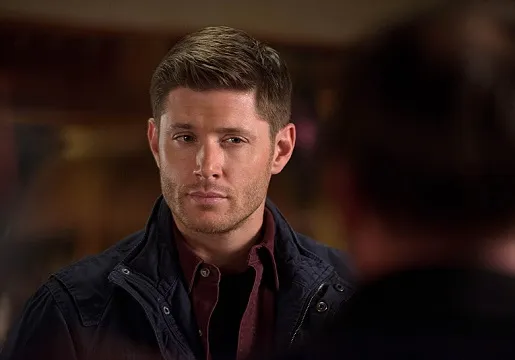
To me, the Men of Letters is where the story should have started. When the boys find out their paternal grandfather belonged to this organization that invented cataloging the lore — basically Bobby’s library would’ve been empty without these guys — it all feels just right. The bunker seems to simply mold to their personalities and routine and motives. Abaddon is the first true badass enemy since Lucifer. The idea of the Demon and the Angel Tablets is what was missing from previous Biblical-themed arcs. Castiel’s back, Crowley’s back, and they have new subplots, new motivations, and new alliances.
Which is why it hurts my heart so much to have to admit this next stage of the show lacks in one major way: the side characters.
The fact Bobby isn’t around to join them in the bunker is a travesty. Ben and Lisa being dropped is…not cool, in my eyes. Killing off Jo and Ellen and Rufus probably wasn’t a smart move by the armageddon-era crew. We needed more Garth, not less. Jody Mills deserved a lot of additional screen time (and better plots). And, personally, I loved Benny, and to this day want more than a few appearances from him.
Whereas I really liked Ruby #1 (but not #2, and watching the boys kill her was intensely satisfying), Meg #2 (her sense of humor and bond with Cas always hit), loved to hate Bela, found Balthazar to be a good blend of comic relief and learning what honor really means, enjoyed when Gabriel was the Trickster, and even Chuck was entertaining at first. But Kevin didn’t do it for me, Frank was meh, Becky was just a silly addition, and Charlie Bradbury makes my list of top 10 most annoying sidekicks.
And this is where the show starts to feel even more like a spinoff of itself. We barely hear anymore about Mary, or Jessica (yeah, remember, Sam’s girlfriend killed by the Yellow-Eyed Demon?); it seems nobody recalls Lucifer’s in the Cage (until it comes out of nowhere in season 11 — mostly because of The Darkness {hahaha, The Darkness}); the notion that Sam was supposed to go to law school totally disappears for, like, 7 years.
When we reach Sam-about-to-close-the-gates-of-Hell at the end of season 8 — I mean, those scenes are astounding… However…when Sam asks Dean, “What should I ask forgiveness for?”, and he means the specifics, and Dean says, “I’d start with Ruby…” I went, What, we suddenly remember Ruby and Lilith now? And it hit me just how we’d strayed from the origins. We literally went from Sam drinks demon blood and has telekinetic powers to…he’s considered the more pure of the brothers, the better to complete the Trials. And on the one hand, yes — because Dean was the womanizer, he made how many demon deals? (like, four?), he often lied and went behind Sam’s back. But…Dean was also chosen to be Michael’s vessel, whereas Sam was deemed perfect as Lucifer’s. And early on, with the demon blood, and Ruby, and opening the Seals, yes, that paints Sam as the black sheep. But, after getting his soul back, he does nothing but try to achieve redemption. And after Lisa and Ben are out of the picture, Dean seems to be back to one-night stands and indiscriminately killing anything that bleeds.
However…that’s also how we like our boys. Sam is the more intellectual, the more scholarly, the more naturally sensitive. Dean is the tough guy, not who you’d bring home to your parents, but who you’d absolutely want in the foxhole with you.

By the time we start season 9, there’s a real concrete sense of what we’re here for, and the show does seem to become almost fourth-wall-ish aware of this. We want the boys, hunting together, and if they have a fight, for it to be about a real, solid reason, that still won’t pull them apart forever. We want Cas, strong and powerful, and naive and wonderfully genuine. We want Bobby’s influence and love stamped on every decision they make. We want Crowley to be snarky and clever and the King of Hell. We want the stakes high, but conquerable, and we need some dad jokes and innuendos served up with a decent dose of monster guts.
Oh, and don’t you dare forget the classic rock.
So much of seasons 9 and 10 deliver across the board for me. It’s my favorite incarnation of Cas, of Crowley; Rowena is just a fantastic villain; the whole Cain arc stuns me to this day. “Brother’s Keeper” is, in my opinion, one of the best season finales of the show, and the last 5 minutes makes me cry every time. Even though “the musical episode” is the one most fans of any program consider worth skipping, “Fan Fiction” is beloved among the Supernatural audience, and with very good reason. It weaves in the reality of dropped storylines and forgotten sidebars with all the true heart of the boys in the Impala trying to save the world, and gives Sam and Dean a slightly different perspective on their lives.
Unfortunately, for me, it really takes a (massive) tumble downhill after season 11. 12 almost did me in, and I caught up on a lot of 13, 14, and 15 via the Wiki. The Darkness was, I felt, a laughable villain; letting Lucifer out of the Cage was just foolish; Jack’s whole storyline felt like a copy-and-paste of Cas’ early arc; the alternate universe (and everybody dead being alive, gah!) was not my jam; and the British Men of Letters being plonkers really rubbed me the wrong way.
(And do not get me started on Chuck turning out to be God.)
By the later years, the show was suffering from having become the victim of its own tropes. (“How many times have you two died?!” Amen!) It was like whenever the writers got stuck, they’d have an intern rifle through past scripts and throw ideas in a hat. What should we do this week? Well, we brought somebody back from the dead already, so… Okay, we’ll suggest a side character can’t be trusted. After that? How about a wish that temporarily changes the present reality? Cursed object that makes someone not act like themselves for a day? Any chance we can work in one more time travel bit? Find a character to have some serious family conflict, quick!
Honestly, I didn’t even watch the episode with the wish that brought John back, because I was too worried it would absolutely ruin everything that had come before. As terrific a grouping as Jeffrey Dean Morgan, Jensen Ackles and Jared Padalecki is, part of what made it magic for the show was the notion that it’s past. John dying so early into the boys’ finding their feet as hunters was the driving force behind so much of their character arcs. The story needs John and Mary to be dead. Not that I support the “the parents are always kicking the bucket” trope in fantasy, but in this case, it’s one of the major cornerstones.

So, if I got my wish and had the chance to be the ultimate moth editor, what would my ending look like? I actually mentioned it once in a previous post (approximately six and a half eons ago, so please don’t ask me to find it now), and I believe it solidly works. At the end of season 10 (yeeesss), instead of introducing “The Darkness” (woooooo, I’m so not scared), Death could have agreed to kill Dean — to stop history repeating itself in the Cain-and-Abel way. And this happened just before Rowena completed the spell to break the curse on the Mark, so when she released that magic into the ether, Death’s erasing the Mark’s existence (with Dean’s death) would have created such a strong blowback to Rowena’s spell, it would’ve basically exploded the witch. (Now that’s a banger exit scene!)
Instead of closing up the bunker, Sam would have found other legacies and hunters to train as new Men of Letters; and now he and Crowley would have had a very firm agreement about what demons are allowed to do. And it would have been revealed that Castiel was, in fact, God.
Before the premiere of season 11, I read a Buzzfeed article exploring the various speculations among the fandom about the identity of God (since there were hints given at Comic Con that year that this would finally be shared with viewers in the near future). It was a very comprehensive look at all the theories; and one of them was that Castiel was, actually, the Lord of Heaven, but he’d made himself forget that fact, to protect himself and his ultimate plans from being hijacked by Lucifer, or one of the other angels.
It was a really well thought-out, interesting theory that made a lot of sense. It took into account how Cas was able to rescue Dean from Hell at the start of season 4, how he was strong enough to send Dean through time, defeat the Archangels almost singlehandedly, and why gathering the power of the souls from Purgatory was so important in season 6. (The whole point of that exercise was to amp Cas up enough to gain celestial levels of energy, and be capable of putting down the angel rebellions/in-fighting and restore balance/control in Heaven. Death hinted to Dean that only he and God knew this was even a thing.) The part of Cas’ arc when he Fell and was human for a while, and then when he lost his mind, are also big nods to plenty of world theology/folklore around gods having to live among/as the mortals, or questioning their own sanity in the face of being divine.
I easily got on board this train of mullings; it connected a bunch of dots and ironed out several of the kinks in the show’s framework. I got really excited for the possibility that these fans might be even a little close.
Not that I think you should let fans dominate your ultimate writing plans, but, in this case…taking some direction from the audience would have greatly improved certain things.
(Sighs loudly in the background. Fricking Chuck. Chuck, seriously, folks?)

So, at the end of it all, despite being disappointed by the final episodes, what keeps me coming back to Supernatural?
So many things. Of course, the boys, their bonds, the friendships, Bobby, the Impala, the enemies-to-allies like Crowley and Rowena, the jokes, the great one-liners, the quotes that practically meme themselves. The satisfaction of “doing a little bad so you can do a lot of good”; the tears that flow freely when that gunshot goes off to the background of “Silent Lucidity”; the lump that forms in my throat as Cain gives Dean the Mark and tells the elder brother, “When I call for you, come find me.” Cas announcing, “I’ll interrogate the cat,” or saying so calmly to a self-professed atheist, “I’m an angel of the Lord.” The precious reminder that “family don’t end in blood.”
And totally the fact that I used to sing the theme from The Greatest American Hero as a lullaby to my children; so when human Castiel does so to baby Tanya (S9 E6, “Heaven Can’t Wait”), I will take credit for that idea, please and thank you.
Although 15 years still feels way too long, there is so much good that came out of this show. Some stuff we’ll happily forget about, or pass over. But there’s also tons we’ll eagerly return to, share with others, discuss into the wee hours of the night. This production was comprised of a wonderful, dedicated, hardworking cast and crew, and none of them should be dismissed or forgotten too soon. (Well, maybe the Ghostfacers. And The Darkness. And Becky. And Chuck.)
Despite my undisguised disdain for particular arcs or seasons, the program has fed so many pieces into my everyday life. When I start a comment to the hosts of the We Have Issues podcast, “Hello, boys,” that’s my Crowley line. Bits of the King of Hell, Sam Winchester, Castiel, and the Men of Letters are there to be found in my own fantasy series. If I’m having one of those days where everything goes wrong, eventually you’ll hear me holler, “Son of a bitch!” in that tone.
So, hopefully you’ve reached the conclusion of this post without shaving 15 years off your life. Thank you for coming to my TED talk, because, holy cow, that’s definitely what this was. I hope I haven’t upset anybody too much with my unpopular opinions (ha ha), and that reading this has been worth the whole pot of tea and whole box of cookies. Have a great week, everyone!

July 11, 2025
Table Scraps: ARC Review and Book Promo
Necessary disclaimer: Table Scraps is a horror/comedy novel (yes, you read that right) that I thoroughly enjoyed. However, it also definitely knocked my sensory socks off at (several) points, and indeed, I often don’t review works from the more graphic and gruesome category. So, as I have said before, while I will never stop championing books I love, I’m aware taste is subjective, and that not every work I enjoy will find its slot with every single reader that comes across this review. But, for those of you that may have just found their next favorite, this is absolutely why I’m here.
Okay, onwards!
This is technically an ARC review, though I beta-read the final draft of this soon-to-be-published story. Table Scraps by Anthony LaFauci begins by introducing the narrator/protagonist, Cole, and his other half, Erin, who seems to be trying to break up on this balmy evening in a park in Florida. During this less-than-pleasant situation, an unspecified monstrous creature erupts out of the shadows and attacks Erin and Cole.
After this gangbusters opening, we find ourselves following Cole’s observations as he awakes in a morgue, and it’s revealed he’s not dead — he’s undead, namely, a ghoul. We quickly find out two things: Cole is as shocked as we are, and no, he’s not the same as a zombie — though he does feel an overwhelming need to nosh on humans.
With the assistance of the mortician, Terry (I can’t say anything else without spoilers!), Cole begins to conquer his new hunger, and to navigate a bit of this strange world he’s now part of. (The idea of the instruction manuals cracked me up!)
After a truly trope-breaking section, during which Cole attends his own funeral (brilliant), he finds himself drafted into accompanying Terry on, basically, monster-hunting missions.
In this universe, so many of the typical creatures we’ve come to expect from such a tale do exist — vampires, werewolves, zombies, ghouls (already established), and the like. Terry gets his marching orders from a dude called Roman (NO spoilers!), and almost right away, we the readers can begin to tell there is much more to the plot than appears on the surface.
Moment of dropping the professional pen: Guys, this book is so good. Yes, there were plenty of parts that made me go, “Hahahaha-aaaeeeewwww,” “GAAAAAH,” and even, “YOWSER”; but there were also so many that made me shake with laughter, or feel the sting of tears and a lump in my throat. As I read on, each chapter brought fresh swells of emotion, be it hilarity, poignance, or honestly grossed out. I couldn’t wait to find out what happened next, and when I reached the end of the story, I immediately wanted more.
(For example, I could’ve easily done with an entire spinoff about the side character Tessa. I love Tessa.)
This is a book about monsters that asks the question: When do you lose your humanity? What’s an unnecessary kill, and how do you develop the creature moral compass that determines how far is too far?
And this discussion is had around finely-structured blocks of insane action, and a bit dark but always witty and unique sense of humor. The fight scenes don’t get stale; there’s always new methods, new motives, new enemies; and the narration adapts to the growing backstory as Cole fills in the gaps. This is a tale that never feels stuck in a repetitive loop; I always looked forward to what would come next, even when I started to guess some things. (NO SPOILERS!)
My notes were chock full of hearts and stars and emojis, underlining quotes or quips that nearly broke my heart, or dissolve in giggles. In short, this is a novel that reminds us why combining genres is important, and how doing so gives us greater joy and insight into what may otherwise be seen simply as a silly, icky monster romp.
Cover reveal below (warning: ’tis graphic)

Table Scraps is expected to release this fall. If you’re interested, follow the author, @AnthonyLaFauci, on Twitter/X, and/or subscribe to the podcast he co-hosts on YouTube, We Have Issues.
April 29, 2025
Literary Snobbery Needs to Go Extinct
I present to you a tale of two writing groups: They occur in different time periods, and have different goals, and don’t necessarily include the same people, but they end up on the same path and arrive at the same outcome.
Because this does involve real people in a world I inhabit, there will be a whole lot of parable-izing going on. But, the relevant points can be made without directly calling out any specific individuals.
Group A: The scene and purpose: Several years ago, a number of regular citizens who wanted to journal important life events, so that future generations would have the information and anctedotes to refer to, gathered to embark on this task. However, after a while, the group faltered, as its members felt they were struggling with making sure their drafted words were actually readable — not in a potential bestseller way, but simply, in a way that would deliver the proper intent and meaning of relating the stories they wished to share, in an engaging and comprehendible manner. (Professional writers call this “honing the craft.”) The self-appointed leader of the group declared this approach was not necessary, that there was plenty of validity to merely writing multiple journaling-style pieces on topics one found important to oneself. Parts of the group became disillusioned, or frankly bored, with this method, and attendance declined, and eventually the group disbanded entirely.
Group B: A few years afterwards, an independent writer who wished to belong to a space where they could receive feedback and brainstorming ideas or thoughts for their work in progress, approached a regional public library about hosting such a program (especially as this had been done in the past). Such a thing was arranged, and the call sent out to professional writers, hobbyist journalists, and armchair essayists alike. What assembled was a mix of all of the above.
What the mix seemed to have in common were two things — a disdain for formal instruction in the craft, and of any sort of writing that did not resemble or refer to reality as we know it.
Interestingly, one of the first to stop attending was the same person who wanted the group begun. This moth never did figure that one out, but wondered if it had something to do with the apparent lack of tolerance for non-realistic material (as this first was working on a young adult novel based heavily on mythology and ancient religion).
A new approach was suggested for sharing the results to writing prompts, and for giving feedback. Many more of the attendees vanished, never to be seen again. Through the meetings, this moth (who preferred to stay invisible but would find her voice when there was a thought worth sharing), felt giving this method a chance could be valuable in honing her own skills, and that of the few others who remained.
However, that all changed one day when a comment was made that the fantasy genre, as a whole, is not convincing, and does not draw readers in enough to be compelling reading.
When you consider that this moth has spent her entire life being compelled, convinced, and drawn to her purpose by fantasy media, to hear such a blatantly prejudiced remark, right in front of her as well — when it says right on her resume as card-carrying-author, “cozy fantasy novelist” — well, that was the moment the moth decided to leave Group B.
[image error]Pexels.com" data-medium-file="https://daleydowning.wordpress.com/wp..." data-large-file="https://daleydowning.wordpress.com/wp..." src="https://daleydowning.wordpress.com/wp..." alt="" class="wp-image-29080" style="width:278px;height:auto" srcset="https://daleydowning.wordpress.com/wp... 683w, https://daleydowning.wordpress.com/wp... 100w, https://daleydowning.wordpress.com/wp... 200w, https://daleydowning.wordpress.com/wp... 768w, https://daleydowning.wordpress.com/wp... 867w" sizes="(max-width: 683px) 100vw, 683px" />Photo by lil artsy on Pexels.comOkay, less parable-izing now. (Honestly, talking about myself in the third person just feels strange.)
Anyway, that one comment — not personally aimed, not intended to cause harm — still gave me intense imposter syndrome for days. It hurt, the idea that something I love so much could cause that level of eye roll and disparaging tone. Are there genres I feel like that about? Of course! Do I say it so bluntly in mixed company? God, no! Maybe I’m just built with empathy, or maybe it’s because I like a lot of “niche” subjects, but I naturally have learned not to immediately crap on somebody else’s favorite thing. I know how to read the room, as it were. Apparently, this is not a regular practice for other people.
Also, it was…kind of astounding to me, that, in the year 2025, after the intense popularity of series like Harry Potter, The Hunger Games, Twilight, Lord of the Rings, and Game of Thrones, that literary snobbery — such as “fantasy isn’t a worthy genre” — still exists at all.
The worst part of the whole experience was the fact that I could tell no amount of my explaining, defending, debating, or begging would get the group to even give the topic a fair shot. For whatever reason, the consensus seemed to have been reached before I ever arrived on the scene, that fantasy is silly, or dumb, or just sucks. And, man, if that isn’t discouragement bottled up and then shaken in your face.
So, what did I do about it?
Well, at first, I sulked, and grouched, and wanted to cry.
Then I took a deep breath, brought an author copy of my latest paperback release (yes, these two things coincided) down to the library for the staff to catalogue it. Because all of my publications to date have been entered into the library system. And occasionally, they even get checked out.
And when I gave that fresh new copy to the senior librarian (who I used to work with), and her face lit up with genuine delight at my latest accomplishment, that reminded me why I do this.
For the people who respond like that. Not those who…don’t.
[image error]Pexels.com" data-medium-file="https://daleydowning.wordpress.com/wp..." data-large-file="https://daleydowning.wordpress.com/wp..." src="https://daleydowning.wordpress.com/wp..." alt="" class="wp-image-29242" style="width:635px;height:auto" srcset="https://daleydowning.wordpress.com/wp... 823w, https://daleydowning.wordpress.com/wp... 1647w, https://daleydowning.wordpress.com/wp... 150w, https://daleydowning.wordpress.com/wp... 300w, https://daleydowning.wordpress.com/wp... 768w, https://daleydowning.wordpress.com/wp... 1024w" sizes="(max-width: 825px) 100vw, 825px" />Photo by Suzy Hazelwood on Pexels.comBut all of this leads me to the inevitable question: What makes some readers think fantasy is a lesser form of literature?
I’m aware that the idea of accepting mythical creatures, invented cultural and spiritual paths, and that, no, it isn’t a typo, it is the protagonist’s name, can be too much for some folks. And, as long as they’re respectful about expressing that preference, I won’t be insulted by it.
Where they lose me is the notion that, just because it has centaurs and mermaids or Bigfoot and Nessie, elves and magic being real and lots of Latin, such a book is, somehow, of lesser literary quality than, for example, Sherlock Holmes, or Ann Patchett, or one of those police procedural series where each title includes a dad-joke sort of pun.
Is it simply the way American culture forces us to “give up childish things” when we reach a certain age? (But if so, how would that explain why romantsy and sci-fi and magical realism are bestselling adult categories?)
No, I think it comes down to the old-fashioned, but evidently still pervasive, concept that anything we can’t see, touch, interact with, or scientifically research is not worth devoting our brainpower or emotions to.
And that I just find laughable.
Every single animal, plant, and location on this planet was once unknown to particular peoples or institutes. Just because we claim something doesn’t exist, in fact, does not mean it actually isn’t real. (The elephant being an absolute case in point.) We didn’t understand gravity or how thunderstorms work for centuries; our lack of knowledge never meant these things weren’t happening around us all the time.
One of the exact reasons I love fantasy is the air of mystery, the thrill of discovery, and the joy of wonder suspending your disbelief and just going with it brings.
We have learned so much about this world around us and how it works that…there isn’t so much to be amazed about in the everyday anymore.
And not only does that sound downright dull as dishwater, it makes me sad.
I want to be able to go to a place where not everything has been discovered, even if only for an hour before bed.
I want to believe there’s more out there than what I experience week after week.
If that means I’m somehow immature or not a “proper” reader, then, screw it — I’ll wear that badge with pride.
And I will not stop writing fantasy, probably not ever.
April 16, 2025
Publishing Update!
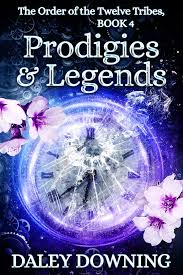
Good morning! I believe this is the latest I’ve ever been with a publishing update or announcement, as it’s been I think 2 weeks since the link went live, but it’s been a *waves hands gesturing to everything* time around here, so I’m a bit off for blogging.
Anyway, for those of you who have been waiting for the paperback release of Volume 4, it is here! Use the link below to purchase a physical copy from Barnes & Noble:
https://www.barnesandnoble.com/w/prodigies-and-legends-daley-downing/1147135174
Summary: Avery McKinnon has always had the ability to see into the future. But one day, she sees something so terrible, she would do anything to prevent it coming to pass – including traveling in time and risking all the paradoxes.
In the fey realm, the Seelie Court prepares to remove a tyrant from power – a necessary undertaking that comes with its own uncertainties.
If all goes well, no one Avery loves will die, a dark elf will be punished for his crimes, and halfbreeds everywhere will be safe, on both sides of the Veil. And there will be graduations, family rifts resolved, and new additions welcomed to the Annex.
She has to succeed.
And remember, if ebooks are your jam, digital editions of the *entire* Order of the Twelve Tribes series — Volumes 1-4 and Fire and Wind — are available at ASAP Imagination:
The Daley Downing CollectionAnd, as always…
[image error]Pexels.com" data-medium-file="https://daleydowning.wordpress.com/wp..." data-large-file="https://daleydowning.wordpress.com/wp..." src="https://daleydowning.wordpress.com/wp..." alt="" class="wp-image-29298" style="width:312px;height:auto" />Photo by Vie Studio on Pexels.comMarch 3, 2025
The YouTube Discussion: Part the Third
I believe I’ve done two other posts like this, hence the title. And here is a cute doggo looking a bit confused, bless him. I’m confused, too.
Specifically about when, or how, or maybe just *waves hands in overwhelming puzzlement* YouTube became its own cable network hitting all the genre tropes.
In my previous posts on YouTube, I talked about how my favorite creators/vloggers were enriching my life and the entertainment scene. Unfortunately, that was a while ago, and now…well…
I’ll just go straight into the rants.
Point the First: What the hell happened to Ryan Trahan?
Ryan Trahan was one of the most wholesome and down-to-earth YouTubers on the platform. He was an average kid who didn’t really know what he wanted to do with his life, and kind of fell into doing reviews of under-hyped restaurants and travel locations. It was a delight to watch his latest forays into the range of venues now offered through Air B&B, hear his thoughts on why this Chinese-Mexican-fusion truck stop in the middle of nowhere deserved more visitors, and get treated to the occasional pup shot of his dog Spock. Then he decided to buy and relaunch an under-performing candy product, and called it Joyride, and managed to get it in the inventory of major retailers like Target. And it was like the man changed overnight.
With Joyride’s success came the apparent fame-and-money-has-gone-to-his-head moment that many fans of various celebrities or influencers expect, but dread, and with good reason. Trahan’s last several videos have been heavily-edited compilations of him traveling across the world, on very expensive flights and trains, dining at exclusive restaurants, and taking his (already spoiled) wife to bucket-list destinations. I am not impressed.
Years ago, I stopped watching travel shows on TV, because they were all about professional chefs or journalists getting special invitations to ancient monuments on protected land and dining on exotic dishes even the locals no longer consumed. No one lives like that. I couldn’t stand the fakeness, and I wanted to see how real people would travel. Ryan Trahan spending the night in an RV at a farm in Missouri, where he could pet the animals while watching the sun set over the hills, and then he got excited when he realized Taco Bell delivered to said RV, was charming and attainable. It actually made me want to try traveling (I notoriously have not left my region in the past 10 years). This 20-something trying to turn into the next Anthony Bourdain has the distinct opposite effect.
YouTube was already filled with travel vlogs, food vlogs, and a combination thereof. Yes, recently a whole lot of these folks have migrated to Instagram or TikTok instead, but the fact stands: Many viewers don’t see the need for more of them on YT, myself included.
Point the Second: Dhar Mann
Remember when network television was chock full of these ridiculous sitcoms with canned laugh tracks and unbelievable plot points, and at the end of each 27-minute episode, everything was back to how it had been at the start and none of the characters had really learned anything or grown? And how these shows fell out of fashion eventually, because people wanted to watch something that made sense and presented relatable discussions? It’s why the vlogs of normal, everyday people experienced such a meteoric rise on social media.
Then there’s Dhar Mann. Who apparently didn’t get the memo that sitcoms with one-dimensional characters and unrealistic storylines were pretty much done away with in the early aughts, for good reason. Dhar Mann’s channel is all videos filmed like a TV show, scripted, using actors, and presenting an “after school special” sort of theme, like bullying, a parent losing a job, a friend caught lying, and so forth. These videos are incredibly gaggy and not one bit how things work in real life. Bullies do not stop their behavior because you ask them nicely. A company focused on the bottom line does not give someone with no experience a high-ranking position because they asked nicely. Teachers will not un-suspend troublemaking kids because you ask nicely. You get the idea.
I hate things like Dhar Mann videos. I hate the wrong impression they’re spreading among kids, that you can get anything you want if you smile enough, that somehow the world will just fall at your feet simply because you dream big. It’s sugarcoating the long and involved process of serious and important matters like adopting children, getting out of poverty, beating addictions, recovering from critical illnesses. My generation was fed all sorts of this crap, and it’s why we wanted our kids to have role models who showed triumph over adversity without covering up the hard parts. Dhar Mann is the anthesis of that, and starting the cycle of impossible expectations all over again.
Point the Third: Drew Gooden and company need to stop whining
How many of us stopped watching daytime talk shows, one-name hour-long whine-fests on cable news, sports channels, and even late night TV, purely because we could no longer handle the intense amount of griping? I gave up on the talking heads ages back — not that I was big on them to begin with — and had absolutely no regrets about doing so. Almost a year ago, I was trying to find new YouTube channels to add to my list, and somehow came across Drew Gooden and his friends, Eddie Burback, Danny Gonzalez, and Kurtis Conner. Now, for whatever reason, Danny and Kurtis’ styles did not gel for me, so I’ve only watched a couple each of their vids. But I’ve spent several nights catching up on the back catalog of Drew and Eddie, respectively.
At first, it was fun — I liked hearing their takes on changes in technology, business models, and entertainment. I enjoyed that, even when the subject matter or tone was serious, they still threw in jokes or light-hearted moments. Then two things happened that drastically changed my mind about both these presenters (separately, but how I feel about both now is a very similar disdain).
One: I watched Eddie Burback’s videos on traveling to every single Margaritaville and every single Rainforest Cafe in the USA and Canada.
Two: A Drew Gooden video gave me a panic attack.
The impacts of One: I found it tremendously hypocritical that a man who literally spends the majority of his time and effort — and gets paid for! — complaining about how pervasive stuff like corporate chains have become in our lives even made these trips — purely for channel content as well! I began to wonder if someone in such a privileged position of being able to spending weeks on end traveling and filming it was really the person we should be going to for rants on DoorDash scams and TicketMaster ripoffs.
The reasons for Two: For a while now, Drew has been whining — intensely — about AI, and how social media feels so toxic anymore, and how streaming services are changing their business models, and…basically everything he uses in his daily life makes him miserable, but…here he is, months later, still using it and whining about it. And sometimes it can be cathartic to listen to someone vent, especially if you agree with most of their thoughts. I honestly enjoyed his reviews on random products he bought from Twitter and Instagram ads, as some were winners, and it was interesting to get a layman’s perspective on these items. But now…the endless bitching and moaning about Facebook bots and Netflix original programming and $76 for a bottle of wine made with grapes picked off the vine by a famous TikToker, and OH MY GOD do not get me started on his insistence on watching Hallmark Christmas movies and somehow being surprised they’re complete garbage. This…is not it, fam.
The other night, I was watching his latest, and after about 15 minutes, could literally feel my blood pressure going up. Before I reached the end of the video, I was starting to hyperventilate, and had to shut it off. I realized I was having the same reaction I used to get when watching horror movies, and yelling at the screen, “Don’t go down there by yourself! Run to the car and drive away from the scary, blood-decorated basement! How stupid are you?!”
That comparison may not seem to connect, but here’s why it does: This man is using all the air in the room to tell us how much he hates this technology that…he could simply stop using. If social media gives him that much anxiety, he can just delete his accounts and find healthier ways to spend his free time than doomscrolling. If he can’t stand watching certain streaming services, he can cancel those subscriptions. If seeing ads gives him FOMO, he can install an ad blocker. “How stupid are you?!”
So, I’m saying buh-bye to the talking heads YouTubers.
Point the Fourth: If It Ain’t Broke, Don’t Fix It
I watch YouTube for entertainment. I like to have a respite from the dumpster fire of reality. I want to spend an hour or two before bed laughing at Gaming Beaver’s attempt at dad jokes; reveling in the so-satisfying-sensation of those 100 layers of whatever coming apart after Preston gives it umpteen whacks with a baseball bat; smirking at non-lethal re-creations of The Squid Games. I enjoy Brianna figuring out the puzzles in the newest Garden of Banban; Kindly Keyin being determined to save all the cute little androids in Astro Bot; DanTDM, against all logic, getting stuck in a vanilla Minecraft seed. I need to see people behaving like decent human beings, even kind and respectful of pixelated NPCs trying to help them complete a level, in a game that has no stakes for the outside world. I don’t have my head in the sand; I’m maintaining my sanity so that I can keep functioning to raise my children and hopefully teach them how not to be asshats.
Anyway, here’s the biggest point of this post — I stopped watching traditional TV a long time ago because I hated “reality” shows, faked DIY, pundits hollering that the planet’s exploding but not offering a single possible fix to any of the problems, and “family” programs teaching kids it’s okay to coerce their parents into buying them an IPad because their dimples are so persuasive. I do not need YouTube to turn into the thing it claimed to be the solution for.
End rant.
January 5, 2025
A Very Personal Post
Usually in January, I make a post about what I hope to accomplish, or recognizing what I did the year before, in conjunction with my WordPress anniversary. This year, though, is already going to be very different.
There’s no easy way to say this, though I’ve constantly been trying to make it more palatable over the last few weeks. My father is in end of life care, and while there is never a specific time frame given for such things, the professional estimate is on the short side. At present, he’s not suffering; truthfully, his brain isn’t completely aware of what’s currently happening, which could be seen as a blessing in this instance; but is, of course, very hard for the rest of us to wrangle with.
Events like the passing of a loved one are always, on some level, expected, and at the same time, we’re never prepared. For me, the biggest wrench in the gears will be the fact that grief is never straightforward; I have no idea just what I may feel when, and this could make trying to plan new creative projects almost impossible. And while everyone will say that new creative projects aren’t my biggest priority right now, I already know that this is what will save me. Not as a way to take my mind off circumstances I can’t control; but as a way to find my path through, on to what comes next.
My dad said years ago he didn’t want a funeral, because funerals are for the living; the notion that the ceremony is “for” the person who’s dead and gone, and possibly not even aware of what’s going on, never really seemed to be the point, for him. Neither did the idea that ceremonies magically sort out all the emotions connected to such a pivotal moment. As an adult, I understand well that grief is not linear, nor contained to one environment. Spending an hour or two in a memorial service, reminiscing, won’t change anything about the fact this person I knew my entire life is now not there, and that I will be feeling all kinds of feels because of it.
That’s the part you have to go through to get to the other side. It sucks. But it just is.
So, while I truly have no concrete idea of what lies ahead for me this year, I already know there will be a path, whenever I need it; my job is simply to start walking it.
I can’t commit to any real schedule regarding posts here or on Kofi, so I won’t. I can promise not to vanish from the community, because I need my people. But even in the midst of this not knowing just what I’m supposed to be doing, I’ve already realized that I…don’t care if there’s a “right” or a “wrong” way.
Because I don’t think there is.
December 19, 2024
A Good Old-Fashioned Top 10 of the Year!
It’s been a while since I did one of these! This list is in no particular order (well, actually, it’s just the order it came back to my brain as I was looking for images). I’m not using any sort of ranking system — well, no stars or points. The criteria is: did this title fill me with joy, laughter, make me collapse in a puddle of tears, or maybe all of the above? Also, just because I read them for the first time in 2024 does not mean they were released in 2024…although some of them were. Also, also, there were books I received in 2024 that I either have not finished reading or have yet to review. And, also times three, I’m not doing blog posts for every single title I read anymore, because, well, life is busy, and…
*Self-induced eye-twitching intensifies*
Anyway. …
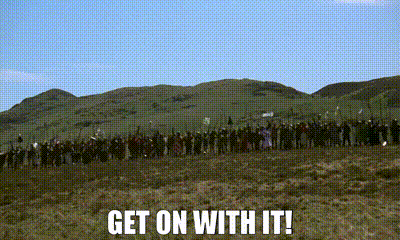
The Monk and Robot series by Becky Chambers
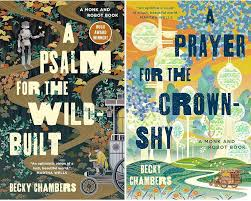
The first work I’ve ever read by this author, and I am absolutely in love and now need to read every single word she’s ever produced. The Monk and Robot series — so far a duology, though I deeply hope Becky Chambers will pen more! — is a beautifully simple tale about human longing and growth and how we find, and hold onto, purpose. I so enjoyed these novellas focusing on a tea monk, Sibling Dex, on a moon colony in the distant future. People no longer use mechanized technology, after artificial intelligence became aware and decided to create their own lives, away from humanity (and, amazingly, humans listened). The crux of this particular biscuit is that Sibling Dex — beginning to feel at odds with their own career path — stumbles upon a robot, Mosscap, who wants to engage with people and learn more about them. As the monk and the robot travel together, not only do they find out a lot about each other’s species, but quite a bit about themselves. The prose, the humor, the poignancy, and the genuine — but not raw or brutal — honesty of what it means to know yourself that’s all wrapped up in these short books made me openly smile and laugh, and then cry, but, really, happy tears.
His Ragged Company by Rance D Denton
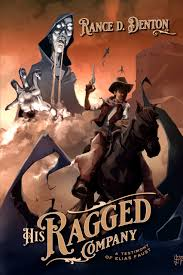
I am not into Westerns. I am not into horror. I loved this book. His Ragged Company does not shy away from grit and grime and gruesomeness — in fact, it runs towards all these things at a full gallop. And yet. There is also so much heart to these characters, and I was so drawn into the story and had to know what would happen at the end. Although I don’t recommend this title for readers who aren’t fond of the gritty and grimy and gruesome (all sorts of profanity included), it will certainly be one of the first suggestions out of my mouth for fans of dark fantasy and Westerns.
Thunderstruck by Daniel Quigley
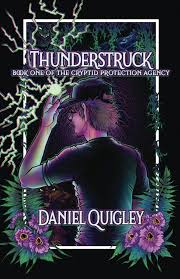
Wonderfully witty and sarcastic and action-packed, Thunderstruck is the tale of a man, Zev, who secretly possesses magic powers, and finds himself pulled into an underground world of mythical creatures and black markets and not-so-nice humans. Along with trying to figure out who to trust and whether he should stay involved in the whole pot of crazy, our narrator has to reckon with fully controlling the abilities he’d like to avoid, and realizing that, just maybe, his powers are a good part of who he could be.
A Necromancer Called Gam Gam by Adam Holcombe
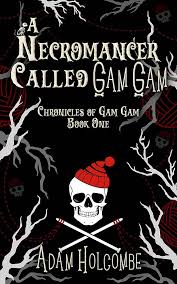
Another genre breaker for me. I don’t do zombies. I do not do the ick and the squelch and the slow decomposition. (Yes, I watched 5 seasons of The Walking Dead, and this is how I know which parts to skip or hit mute.) However, this novella caught my eye and just would not leave my brain alone. I was gifted it by a friend, and quickly found that my instinct was right on. This is the sweetest cozy fantasy about a grandmother who learns magic that can raise the dead. Yes, it’s sweet. Gam Gam accidentally rescues a girl, Mina, who’s in danger and magical herself, and though they’re both out for revenge, the events of the story give them the opportunity to consider what might be the price they pay, and whether it’s actually worth it.
Play It Again by Anthony LaFauci and Stephen Todd
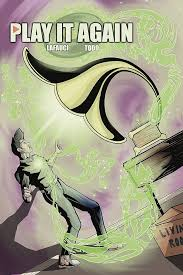
Talk about not being ready for what was in store in these pages! My very first comic review was of this beauty, an early standalone from the team behind the We Have Issues podcast. Play It Again follows the narrator’s sudden time-travel journey via a magical record player, to pivotal moments in his life, while he’s trying to deal with a very heavy breakup. Such a topic is always going to be emotional, but this dynamic duo presents the sadness, the remorse, and ultimately, the faith in love and human connection, and the hope for a better day ahead, in such gut-wrenchingly lovely honesty and openness, you will gladly lie on the floor and sob. Trust me, it’s worth the pain. This was the first time I ever thanked creators for making me cry.
Lore Olympus by Rachel Smythe
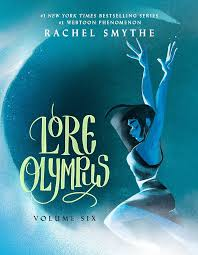
It really should be no surprise that Lore Olympus makes my top 10 for this year, too. And, pretty much, for the rest of time. This reimagined, modernized version of Greek myths in graphic novel format is one of the most tender, most clever, most humorous, most I-will-die-to-see-these-characters-wind-up-happy series I’ve found in years. I stumbled on the award-winning webtoon’s printed format when I still worked at the library, and that was definitely Fate sneaking in while I shelved, since I don’t follow webtoons at all, and realistically would never have discovered this gem on my own.
Don’t Let the Forest In by CG Drews
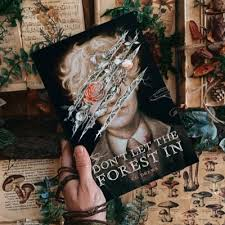
I…have no idea how to review this book. LOL (The author will probably be pleased at the utter babble about to leave my mouth/fingers.) Don’t Let the Forest In is the horror debut from YA author CG Drews (who is also a dear friend). It’s, basically, a Gothic-esque tale, complete with an elite boarding school, a haunted forest, and a narrator who is utterly terrified of everyone and everything. Drews’ lush and evocative prose shines (of course), and the mystery is well-crafted, new layers bringing up more questions than answers, which fits perfectly into the increasingly disturbing atmosphere. Interestingly, I wasn’t actually disturbed during reading, a testament to Drews’ ability to draw in the audience, creating the need to delve deeper into the story and just ride along with it. (Okay, I guess I found review words.) If I had to find a way to describe the ultimate level of twistiness this book reaches, though, and avoid spoilers, it would simply be: But if (redacted) is really (redacted), then does that mean (redacted) was (redacted, redacted, redacted!) all along?!????
That’s truly a compliment, and the author agrees, I’m sure. XD
The Tea Dragon Society series and The Moth Keeper by K O’Neill
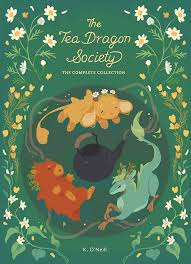
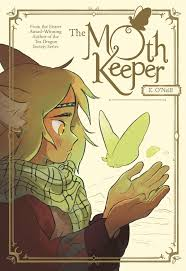
Yes, I know The Tea Dragon Society trilogy has been out for a while. But I only read them for the first time ’23’-24, and don’t believe I’ve ever posted about them. K O’Neill is a wonderful artist, showing so much depth and complexity to the characters in simple scenes, and the words always enhance the story. There is no fluff or filler in these graphic novels, yet such a rich and nuanced tale unfolds. The Tea Dragon series is all about finding oneself, supporting each other, and learning to be patient through life’s challenges. Their newer standalone, The Moth Keeper, also focuses on themes of self-esteem and growth, but is set in a completely different world than that of the Tea Dragons, with its own lovely characters and deep premise. All of it is so very touching without ever getting too dramatic or purpley, and I adore these works.
Fogbound by NJ Alexander
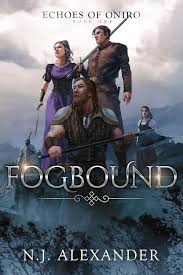
I wrote somewhat of a parody review on this title (with the author’s permission), but what I said about the themes and characters were totally serious, and still stands. Fogbound is, in many ways, a love letter to epic fantasy and its tropes, but the characters are flushed out, the worldbuilding grounded, and the gentle subtext about protecting one’s ability to choose one’s destiny make this book stand out. If you’re an epic fantasy fan, definitely give Fogbound a go.
The Last Available by Sean R Frazier
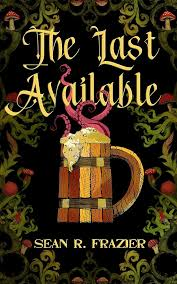
And now from the sublime to the ridiculous — literally! The Last Available is a parody novel that takes all the tropes of TTRPG and stereotypical fantasy literature and turns them on their heads. It’s a rollicking adventure about inept and immature “heroes” who are chosen to save the world because folks who could actually get the job done aren’t around. There are a thousand fourth wall breaks — many of which cracked me up — tons of dad jokes, innuendos, moments you can’t explain, and moments you don’t want an explanation for. It’s kind of like if a college theatre group decided to play D&D after watching a Monty Python movie and having a few too many beers. And then somebody wrote it down, because they figured, why not. If you want a read that’s just fun, no strings attached, then you’re in the right mood for The Last Available.
And, finally, that’s it! Ta-da! Happy holidays, everyone!
November 22, 2024
Everything’s Changing and I Don’t Like It
I really miss the days when we could confidently walk into a store on October 21st, and know for certain there would only be Halloween decorations in the displays. Everyone seemed to understand; there was a sort of unwritten rule about social things such as holidays; to everything, there is a season. This year, however, as early as mid-September, I’d walk into a store and instantly be thrown into a time vortex, where apparently it was Hallow-Thanks-Christ-ween-giving-mas.
I really don’t like walking into the library or a bookstore to browse the new releases, and seeing that they’re all a version of romance — even the epic fantasy, murder mysteries, and historical fiction, and realizing there’s nothing I want to read.
I’m so tired of spending 20 minutes scrolling through streaming services, only to find most of the “original” movies and shows and even documentaries released in the past few months are 90% filler with mediocre effects and scripts very probably written by AI.
There are very few book blogs anymore. If I want similar content, I have to go to YouTube, TikTok (which I don’t use), or Instagram (which has shadowbanned me). And I don’t absorb certain information very well by visuals/audio, so I prefer to read things like book reviews. But it seems nowadays the only option for coherent text reviews is Goodreads — where I no longer have an account.
Most of the hot new music is in categories I didn’t listen to much before, and definitely don’t now that I am officially old. I don’t recognize the pictures of up-and-coming celebrities, who (apparently yesterday) were 16-year-old social media influencers. I’m not familiar with the brand names of cosmetics companies, home decor styles, or the coolest plushies.
I can’t even say it’s because I live under a rock; I don’t. I’m on social media, I read news on current events and pop culture, I watch YouTube, I have a Spotify account that often suggests new bands or podcasts for me. I’m not the happening-ist person (yes, I’m aware no one says that anymore), but I am definitely not the most out-of-touch. It’s simply that everything seems to be changing so fast.
Just a year ago, many tech and entertainment corporations were saying they had a limited use of AI and it was going to stay that way. Now all the trailers, all the ads, all the shorts, all the websites, all the phone calls, seem to be using AI in some capacity. Typos are running rampant and unchecked in subtitles and photo captions; something that sounds almost like a person calls to let us know our dentist appointment has been cancelled, and it mispronounces just enough words to tip me off it’s a computer reading a typed message.
Nobody has an office number anymore. Everybody has a work cell that promptly gets turned off at 4 p.m., which is not useful when I’m not available to talk to service professionals before mid-afternoon. The traditional notion of “office hours” now varies from place to place, and it isn’t even dependent on the industry. I can call a vet 2 miles down the road and be told they’re open Monday through Thursday, 8 to 3; then repeat this process with another vet 5 miles in the opposite direction and get the answer of, it’s Tuesday through Saturday, 9 to 6.
There’s no consistency.
I’m not saying everything needs to be uniformly the same; historically, we know that’s a recipe for disaster. But it should be not too much to ask for a sense of normalcy.
And don’t say I’m describing “the new normal.” Everything feels…fractured. Incoherent. Unconnected. There are pieces of the world moving ahead at a frantic pace, with most people either struggling to keep up, quite unaware of how much these things may soon affect their everyday lives, or even trying to pretend they can still be living in a way that was common 30 years ago.
It’s…weird.
And I’m tired. I don’t know if I can keep up anymore with who’s in, who’s out, who’s cool, who’s not, and why I should even care, since even that appears to change from week to week. My favorite businesses today could be in the doghouse of public opinion tomorrow — then it will switch back in another month, depending on some trend or some comment or some new meme.
And maybe I am showing my age, but I honestly feel I have better ways to spend my time than knowing what’s going to be hot for the next 5 minutes.
Daley Downing's Blog
- Daley Downing's profile
- 36 followers



